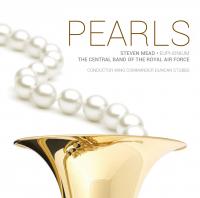
Steven Mead - euphonium
The Central Band of the Royal Air Force
Wing Commander Duncan Stubbs - conductor
BOCC122 Release date May 10, 2014
Repetoire
Pearls II - Roland Szentpali
1. i. Nissan 300 2X 3.20
2. ii. For Deny 5.21
3. iii. The Last Dance 5.12
4. Sir Eu - Thomas Doss 11.25
5. A Child is Born - Thad Jones Arr. Stephen Bulla 4.43
6. Fast Forward - Hans Van der Heide 3.30
7. Ascension - Tom Davoren 8.11
Duet for trumpet and euphonium, featuring Ben Godfrey
8. Amazing Grace - Trad. Arr. Stephen Bulla 3.20
Euphonium Duet featuring Misa Mead
9. Introduction and Rondo Capriccioso - Camille Saint Saens Arr. Stephen Bulla 9.57
10. Romance (from The Gadfly) - Dmitri Shostakovich Arr. Ed Keeley 4.00
11. Euphonic - Franz Cibulka 11.34
Total playing time: 70.45
Additional Info
After the overwhelming success of my previous album with the Central Band of the RAF I knew it would be a good idea to follow up the Diamonds CD with another project. The main factor for me would be how to equal the quality of the repertoire of the first disc. As ideas for ‘Pearls' materialised, I realised that this mix of music, some of it more in a jazz idiom than previously, would be very strong. The major works on this new album demonstrate the huge possibilities that exist with the euphonium as a solo instrument, accompanied by an outstanding wind orchestra such as we have here. The title track Pearls II by my good friend Roland Szentpali is really a breath of fresh air, and mixes modern styles so perfectly. It's exhilarating and challenging to play, as is the new composition by the Austrian composer Franz Cibulka, Euphonic, that I premiered in Germany about six months ago. For some years I have been enjoying performing Sir Eu by another Austrian, Thomas Doss, and I felt it was definitely time to record this in its version with wind orchestra. A chance meeting with the American arranger Stephen Bulla last summer, led to the inclusion of three of his arrangements, and the most challenging of these of course is the violin composition by Saint Saens, Introduction and Rondo Capriccioso. So the music on this Pearls album encompasses possibly the widest range of styles and genres that I have ever recorded. We have romance, folkloristic music, big-band, traditional, classical,
funky... and probably a few others! I hope you enjoy the mix. Once again it has been absolutely wonderful to work with the Central Band of the RAF, whose skill and dedication makes any musical collaboration with them such a pleasure.
Here's a review by Ron Holz in the British Bandsman 16th August, 2014
Pearls
Steven Mead (euphonium) with the Central Band of the Royal Air Force (Duncan Stubbs)
In this diverse, attractive, entertaining disc, world-class euphonium soloist Steven Mead teams up with one of the UK's outstanding wind bands in a programme even more engaging than their award winning collaboration of 2012, Diamonds. Mead's very considerable technical skills are on full display, while the repertoire also pays particular attention to his warm, lyrical playing. The RAF Central Band and Duncan Stubbs provide first-class accompaniments; just what one would expect from this leading wind band.
The highly eclectic mix of new music, both original compositions and arrangements for euphonium and band, slants towards a strong, jazz- inflected (and related popular styles) posture, though not exclusively so. The title work Pearls II by Roland Szentpali takes the form of a high energy, three-movement suite in which the wind band at times resembles an expanded jazz ensemble, including effective use of piano, especially in the closing movement, a jazz waltz. Thomas Doss pays tribute to Mead in Sir Eu, the title reflecting Mead's involvement in the European brass scene. The cadenza that precedes the finale is a stunner - Mead gives it his inimitable touch.
Ballad-style works, an interest of the soloist, balance the technical display. Bulla's adaptation of jazz trumpeter Thad Jones's A Child Is Born intrigued me, as I have usually encountered it in Jones' own big- band setting. Here Bulla restricts himself to an accompaniment force of woodwinds, vibes, string bass, and drum set - a delightful frame
in which to savour Mead's rich sound. Other lyrical standouts are the transcription of Shostakovich's Romance from The Gadfly (arr. Ed Keely) and Bulla's Amazing Grace in which we hear Steven joined by his new wife, euphoniumist Misa Akahoshi Mead. They make a great musical pairing, and Bulla's arrangement will prove to be a classic setting of this universally acclaimed melody.
Another soloist, trumpeter Ben Godfrey, matches up very well with Mead in Tom Davoren's challenging duet, Ascension. Here is another high-energy work commissioned especially for Mead and Godfrey to perform with both the RAF Central Band and the Brass Band of Battle Creek. Lots of exuberance in evidence as the musicians mimic in sound the ascent and descent of Felix Baumgartner's 2012 Red Bull Stratos Jump.
Steven Mead has always sought to expand the repertoire of the euphonium. A pleasant surprise in that category is Bulla's wonderful adaptation of Saint-Saëns' violin solo, the famous Introduction and Rondo Capriccioso. Not only is the soloist at the top of his ‘game', arranger and band provide a spectacular vehicle for the renewal of this classic.
Two more festive works by European composers round out the programme, Fast Forward by Dutch writer Hans van der Heide and the really scintillating closer, Austrian Franz Cibulka's Euphonic. In the latter Cibulka makes good use of American funk styles, among other pop styles embraced, to drive the tour-de-force that summarises the essence of this highly accessible recital. The opening with electric bass, vibes, and percussion will draw you in - and the some of the unison licks by the band and Mead are breathtaking. The production aspects are excellent, including an attractive 16-page booklet containing highly-informative notes. Recording engineer Richard Scott captures Mead's sound perfectly, centring it within the band's rich timbres. This is an exceptional compact disc I highly recommend. Ronald W. Holz

